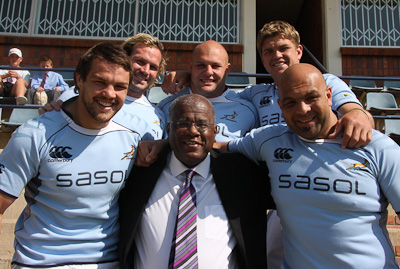Latest News Archive
Please select Category, Year, and then Month to display items
02 January 2025
|
Story Gerda-Marie van Rooyen
|
Photo Supplied
 Leading the research in South Africa is Prof Linus Franke from the Department of Soil, Crop and Climate Sciences.
Leading the research in South Africa is Prof Linus Franke from the Department of Soil, Crop and Climate Sciences.
Scientists are actively pursuing the successful breeding of diploid hybrid potatoes from inbred lines. This is expected to revolutionise potato breeding as it holds the key to rapid genetic progress. It will introduce new varieties for commercialisation through seed. Currently, existing potato variants have a gene that renders self-pollinated seeds infertile.
Prof Linus Franke, an academic in the Department of Soil, Crop and Climate Sciences at the UFS, is leading the research in South Africa. “This technology allows the production of genetically uniform potato seed that is easy to transport and largely disease-free.” He says this differs from conventional breeding whereby only vegetative propagation is possible due to tetraploid varieties in potatoes. It also risks carrying pests and diseases from one generation to the next – leading to the accumulation of pests and diseases with each round of multiplication.
Seed innovation
Prof Franke explains that Solynta BV, a seed company based in the Netherlands that produces potato varieties that can be grown from seed, has included South Africa in their research efforts because it is one of Africa’s largest producers and exporters. Through his academic relationship with Wageningen University and Research, a Dutch institution renowned for its agricultural endeavours and food production, the UFS became involved in researching hybrid potatoes grown from seed.
Diploid seeds containing two sets of chromosomes allow easier gene manipulation to increase predictability and speedier genetic progress. The breeding approach enables the incorporation of tolerance to pests, diseases, abiotic stresses (cold, heat, drought) and other desired genetic traits.
Although Prof Franke is optimistic about this research, he is not blind to disadvantages. “Potato seeds are tiny and have little energy reserves, making it harder to grow potatoes from seed than from tubers.” He says potatoes from seed will take longer to cultivate than tubers, as farmers need to grow plantlets from seeds first, adding six weeks to the growing period. “It is possible that commercial farmers can grow potatoes directly from seed. Alternatively, perhaps more likely, specialised growers will produce tubers of potatoes from seed; these tubers are then sold as seed tubers to other potato farmers, who then continue their normal practices of producing potatoes for the market from tubers.”
Financial benefits
Prof Franke says farmers have reason to get excited. “Seed potatoes will reduce input costs, as varieties with enhanced tolerance to pests and diseases require less pesticides. Planting one hectare of potatoes requires three to four tonnes of potato tubers, but only one 25 g packet of potato seeds.” Since potatoes are a more valuable commodity than maize, this technology might also increase farmers’ income potential.
Springboks choose Kovsies' sports facilities
2010-09-02
 |
|
The Springbok team boasts five former Kovsies. From the left, front, are: Flip van der Merwe, Prof. Jonathan Jansen, Rector and Vice-Chancellor of the UFS, and Gurthro Steenkamp. At the back, from the left, are: Jannie du Plessis, C.J. van der Linde and Juan Smith.
Photo: Gerhard Louw
|
Over the years the University of the Free State (UFS) has already produced 67 Springbok and 22 Springbok Sevens players. Therefore it comes as no surprise that the Springboks have chosen the UFS’s sports facilities in preparation for their match against Australia this coming Saturday. They will tackle Australia at the Free State Vodacom Park at 17:00. Five former Kovsies are included in this team. They are Flip van der Merwe, Gurthro Steenkamp, Jannie du Plessis, C.J. van der Linde and Juan Smith.
Kovsies have been providing quality rugby for many decades already. During the 2009 rugby season the UFS rugby club produced 12 players for national teams and 73 players for provincial teams (all age groups). This does not include all the former Kovsies. According to Mr Rockey le Roux from KovsieSport at the UFS, there is currently not one South African Super 14 team that does not include a Kovsie or former Kovsie.
The UFS is also equipped to produce top rugby players. Shimla Park is the main field of Shimla rugby, where all the Shimla games are played. Some of the Varsity Cup games are also played on this field. Boom Prinsloo, the Shimla player named as the 2010 player of the Varsity Cup tournament, is included in the current Springbok Sevens practice team. Shimla Park boasts 1 000-lux lights, which let this field comply with international standards.
There are four more rugby fields that are used for residence rugby. Currently 26 rugby teams of the university's residences and three provincial teams practise on the fields.